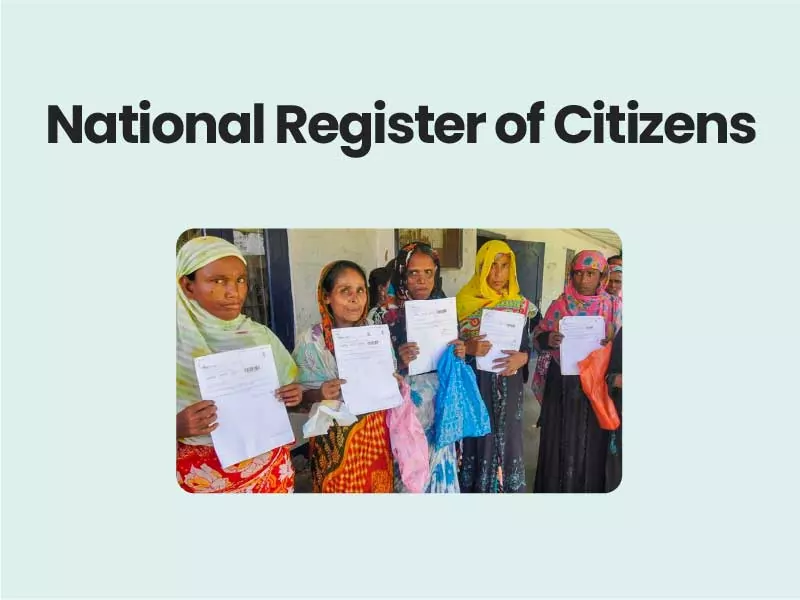Companion@360 → 7 Month programme to sharpen your writing skills → REGISTER NOW

National Register of Citizens
The National Register of Citizens (NRC) is a list of Indian citizens of Assam. The NRC was introduced to identify illegal immigrants from Bangladesh and recognise the Indian citizens in Assam. It was prepared in 1951, following the census of 1951. Assam has become the first state to get the first draft of its own updated NRC.
For a person’s name to be included in the updated NRC list of 2018, he/ she will have to furnish:
- Existence of name in the legacy data: The legacy data is the collective list of the NRC data of 1951 and the electoral rolls up to midnight of 24 March 1971.
- In case of the applicants born after 1971, by Proving linkage with the person whose name appears in the legacy data.
Objective
The NRC is now being updated to detect Bangladeshi migrants who may have illegally entered Assam after the midnight of March 24, 1971.
Role
The process of updating has undertaken as per provisions of the Citizenship Act, 1955 & the Citizenship (Registration of citizens and Issues of National identity) Rules 2003.
The updating process started in May 2015 and ended on 31 August 2015. A total of 3.29 crore people applied through 68.31 lakh applications. The process of verification involved house-to-house field verification, determination of authenticity of documents, family tree investigations in order to rule out bogus claims of parenthood and linkages and separate hearings for married women.
Read Also Electoral reforms in India
Concerns
- There is a renewed conviction that the exercise of counting Assam’s citizens is a political one, and the new register will be a document of exclusion, not inclusion.
- There are important humanitarian concerns, concerns that go beyond identification and numbers.
- Nearly five decades have elapsed since the cut-off date of March 25, 1971, and individuals who have sneaked in illegally have children and grandchildren by now.
- Discrimination against Muslims and Bengalis.
- In at least 10 districts the records are incomplete or unavailable.
- A number of people may be deprived of citizenship through this process.
- Forged documents.
- Delay in process.
- The security situation in the entire neighbouring states would be affected.
- Communal violence and potential to sow seeds of violence in the state
- Housing the ones who are declared illegal immigrants is a concern as the existing detention centres have poor infrastructure.
- Proposed citizenship amendment that grants citizenship to illegal immigrants of Hindu, Sikh, Buddhist, Jain, Christian faiths is severely opposed in Assam.
Challenges
- Flawed Process – People who found themselves on the first list that was released on January 1, 2018, didn’t find their names in the second. Even the family of a former President of India did not mention on the list.
- The parallel processes of NRC, the voters’ list of the Election Commission, and the Foreigners’ Tribunals with the help of the Assam Border Police have led to utter chaos, as none of these agencies is sharing information with each other.
- Though the draft provides a window for re-verification, due to a large number of people being excluded from the list, it will be very difficult to physically verify all of them.
- Since such ‘non-citizens’ can resort to judicial relief to substantiate their citizenship claim, it can lead to overburdening of the judiciary which already reels under a large number of pending cases.
- There is uncertainty about the future of those left out from the list.
- Expelling them to Bangladesh is not an option since Dhaka has never accepted that they are its citizens or that there is a problem of illegal immigration. In the absence of a formal agreement, India cannot forcibly push the illegal migrants back into Bangladesh.
- Moreover, raising this issue can also jeopardise relations with Dhaka. Such an attempt would not only damage bilateral relations but also sully the country’s image internationally.
- Apart from deportation, the other option is large scale detention camps – which is an unlikely option for a civilised democracy like India.
- Another option is instituting work permits, which would give them limited legal rights to work but ensure they have no political voice. However, it is not clear what will be the fate of children of such individuals.
- With no end to uncertainty, NRC seems to be a process without an end.
Read Also Anti Defection Law in India
Way Forward
- India, as a country, should not be hasty in taking decisions that can disenfranchise her citizens – contradicting its centuries-followed values.
- A person’s citizenship is a basic human right. Declaring people foreigners in haste without judicially verifying their credentials can leave many human beings stateless.
- The need of the hour is that Union Government should clearly chart out the course of action regarding the fate of excluded people from final NRC data and political parties should refrain from colouring the entire NRC process through electoral prospects that may snowball in to communal violence.
- There is a need for a robust mechanism of legal support for the four million who have to prove their citizenship to India with their limited means.
[the_ad id=”8354″]
